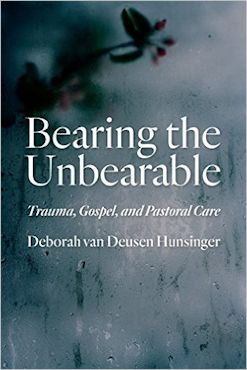
|
Posted October 15, 2015
Book: Bearing the Unbearable: Trauma, Gospel, and Pastoral Care Author: Deborah van Deusen Hunsinger William B. Eerdmans Publishing Company. Grand Rapids, Michigan. 2015. Pp. 163 An Excerpt from the Introduction:
I envision trauma as a series of nested concentric circles, affecting every level of our lives, beginning with the suffering involved in facing our own mortality and personal capacity for evil and reaching progressively outward to traumas that have greater scope: with the next circle comprising the interpersonal traumas of divorce, death, disease, or disability affecting ourselves or those we love. As the concentric circles grow larger, we encounter the kind of trauma that has the betrayal of trust at its core: infidelity, domestic violence, rape, incest, and child abuse. . . . . Like every discipline in theological study, pastoral theology is intrinsically interdisciplinary, as it builds bridges of schorlarly conversation with a wide number of fields: not only psychology and psychotherapy in relation to theology and biblical studies, but also economics, sociology, political science, ethics, literary studies, poetry and the arts, criminal justice, and peace studies. This volume reflects some of those shifts, examining trauma from a number of interpretive frameworks that are then brought into dialogue with Christian theology. An Excerpt from the Book: How do we develop the skills we need to witness another's suffering? In her book Common Schock: Witnessing Violence Every Day, Weingarten addresses the question in detail. . . .Dr. Weingarten seeks to empower those who witness violence to become conscious witnesses rather than reactive or numb bystanders. She chooses the term "common shock" rather than "trauma" because she believes that not all response to violence warrants a mental health diagnosis. Common shock might lead to an acute or chronic stress reaction, to trauma symptoms, or to full-blown post-traumatic disorder. The phrase "common shock," in other words, is meant to cover a wide range of responses that have varied consequences for the individual, her interpersonal relationships, her community, the larger society, and the world. Common shock comes to nations, to communities, the larger society, and the world. Common shock comes to nations, to communities, to families, and to individuals through a variety of means: a medical diagnosis, a chronic disability, a criminal assault, a tornado, a flood, a bombing or a politically oppressive regime, among others. While some people might undergo an acute stress reaction and others might need therapeutic help for post-traumatic stress disorder, many who undergo severe stress do not need or even seek medical attention. The difference between a shocking event that leads to trauma and one that does not, Weingarten suggests, might lie more in the individual's or community's response to the event than in the event itself. Thus the decisive question becomes: Are there witnesses available who are willing to listen compassionately to those devastated? Table of Contents: 1. Bearing the unbearable: Trauma, Gospel, and Pastoral Care 2. Rooted and grounded in love: compassionate witnessing 3. Christian forgiveness: healing the emotional wounds of childhood 4. Keeping an open heart in troubled times: self-empathy as a Christian spiritual practice 5. Prayers of lament: "How long, O Lord" 6. Practicing Koinonia: life together 7. Members of one another: building a restorative church Appendix 1: Criteria for PTSD: diagnostic and statistical manual Appendix 2: Professional quality of life scale: compassion satisfaction and fatigue subscales -- Revision IV |
|
